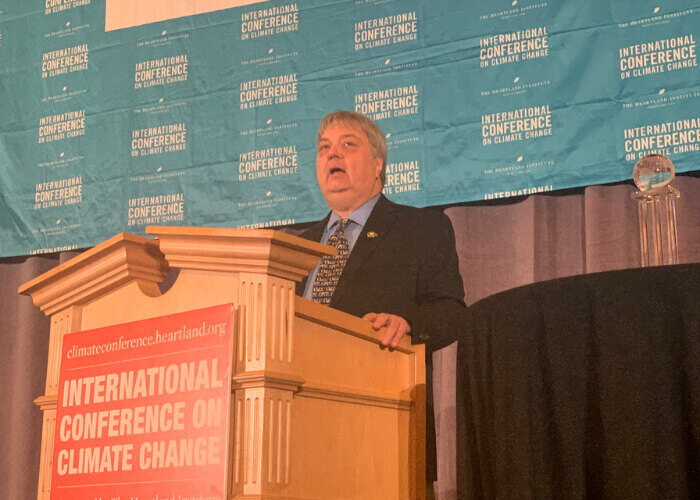At The Heartland Institute’s 14th International Conference on Climate Change (ICCC-14) in Las Vegas, Nevada researchers in the fields of climate science, energy economics, and public policy presented their current research concerning climate change and the likely effects of policies proposed to prevent it.
Three keynote speakers, David Legates, Ph.D., Patrick Michaels, Ph.D., and William Happer, Ph.D., discussed the inaccurate portrayal of the current state of the climate by many scientists, and the dangers of policies proposed to restrict carbon dioxide emissions to prevent climate change.
Chariots of the Gods, Not!
Opening dinner keynote speaker David Legates, a professor of climatology in the Department of Geography at the University of Delaware, received the Frederick Seitz Memorial Award from the Science and Environmental Policy Project (SEPP) at ICCC-14.
Legates told the audience that when he was in 8th grade his interest in Erich von Daniken’s “Chariots of the Gods?” made a lasting impression, ultimately arming him with the tools necessary to study climate change.
“To an 8th grader, ‘Chariots of the Gods’ makes an awful lot of sense because von Daniken takes a bunch of pieces of a puzzle and puts them all together,” Legates said.
About two weeks later, Legates says he discovered the book “Crash Go the Chariots,” by Clifford Wilson.
“If you read that book you may realize that von Daniken may not have gotten it just right–that his intricately woven tapestry may have some holes, that some of the pieces of the puzzle may not have actually been there, that in fact, they may have been fraudulent or made up,” Legates said. “Essentially, what you wind up with is two different viewpoints of the same thing.
“That allowed me to understand the concepts of scientific debate and scientific discourse–that you could look the arguments from both sides and then evaluate the two,” Legates said.
‘Standard Skeptic Crap’
Legates loaned the book to a teacher to get his view of Wilson’s analysis.
The teacher read the book over the weekend, and on the following Monday dropped it on Legates desk and said the three words he said he would hear repeatedly course of his career, “standard skeptic crap.”
“I learned something that day,” said Legates. “There is scientific discourse, and there is indoctrination–one size fits all, nobody must disagree, we’re not allowed to listen to the other side of the spectrum.
“So, when I finally [began] my quest to investigate … climatology, I carried that with me, and as a result, I want to look at why things happen and understand them based on the facts, and as Fred Singer used to say, ‘If the facts change, I change my view, what do you do?,’” Legates said. “That’s the scientific method, that’s what we should be striving for.”
‘A Very Strange Issue’
Saturday morning’s keynote address, titled “Climate Models vs. Reality,” was delivered by Patrick Michaels, a senior fellow with the CO2 Coalition and the Competitive Enterprise Institute.
He began by asking why people were gathered in Las Vegas to discuss climate science?
“This issue is a very strange issue in that only climate models, figments of a persons’ imaginations, written into a computer, are supposed to determine our way of life,” said Michaels.
The climate models that are determining how we’re supposed to live have the wrong inputs, says Michaels, comparing it to “putting diesel fuel into a car that’s supposed to run on gasoline.”
As a result, Michaels said “the models run far too hot.”
Oct. 5, 2021, a Nobel Prize in Physics was awarded to Suki Manabe of the Princeton Geophysical Fluid Dynamics Laboratory (GFDL) for physically modelling of earth’s climate. This despite the fact Manabe’s models didn’t work right.
“His model doesn’t work reliably,” Michaels said. “This [climate science] is an odd field–the more money you throw at the science, the worse the model becomes, until the most unreliable model wins the Nobel Prize.
“So, what world do we really live in? It’s one that is ‘lukewarming,’ and it’s an increasingly greener world,” Michaels said.
‘Noble Lies’ and ‘Hobgoblins’
“Noble Lies” was the title of the keynote address delivered at the lunch on Saturday, October 16, by William Happer, professor emeritus in the Department of Physics at Princeton University.
“In politics, a noble lie is a myth or untruth, often, but not invariably of a religious nature, knowingly propagated by an elite to maintain social harmony or to advance an agenda,” Happer said quoting Wikipedia’s definition.
The concept of the noble lie, says Happer, is closely related to the “noble cause corruption,” of which Wikipedia says, “‘Where traditional corruption is defined by personal gain, noble cause corruption forms when someone is convinced of their righteousness, and will do anything within their powers to achieve the desired result.’
“Does that sound familiar?,” asked Happer.
“In either case we’re dealing with the ancient lie that the ends justify the means and that sure sounds like what we’re dealing with in the climate movement,” Happer said.
The lie is that we face a climate emergency due to CO2 releases from burning fossil fuels, says Happer.
“This is indeed a lie, there is no climate emergency, and there is no way there will ever be a climate emergency, but we’re all being asked to give up our inalienable rights to life, liberty, and the pursuit of happiness to let our alleged betters manage to defeat this threat caused by the carbon polluters,” Happer said. “That always gets me ‘carbon pollution’ when each of us here is breathing out 2 pounds of carbon [dioxide] a day.
“Climate [change], therefore, is the ultimate hobgoblin,” said Happer. “The climate has changed since the world began and will continue to change as long as long as the world exists, but humans have little to do with climate change.”
Kenneth Artz (KApublishing@gmx.com) writes from Dallas, Texas.
